
Wilbur James Cobb (January 20, 1929 – May 24, 2020) was an American jazz drummer, known as Jimmy Cobb, and a member of the legendary Miles Davis’s First Great Sextet.
Wilbur James (Jimmy) Cobb was born in Washington, D.C. on January 20, 1929 to Wilbur Cobb, a security guard and taxi driver, and Katherine, a domestic worker. As a teenager in the mid-1940s he became obsessed with jazz, listening to American wartime broadcasts and washing dishes in diners to save money to buy a drum kit. His dream was to learn the polyrhythmic innovations of the bebop drum masters Kenny Clarke and Max Roach.
Although he briefly studied with the National Symphony Orchestra percussionist Jack Dennett, Jimmy Cobb was mainly self-taught, but he had accompanied legendary singer Billie Holiday and played with Jazz legends Charlie Parker and Miles Davis before he was 20 years old.
By 1950, he was on the road with Earl Bostic, whose hit-making R&B band of the period included such jazz-sax greats as John Coltrane, Benny Golson, and Stanley Turrentine. Jimmy Cobb then accompanied Dinah Washington for some years, during which Jimmy Cobb was having a relationship with her, and a young Quincy Jones was doing some of the her arrangements.
In 1956, saxophonist Julian Edwin “Cannonball” Adderley hired Jimmy Cobb to play on his Verve Records sessions “Sophisticated Swing”, “Quintet In Chicago” and “Takes Charge”, with the latter two backed by the Miles Davis band without Miles.
Jimmy Cobb then joined Miles Davis in 1957 as part of the Miles’s First Great Sextet and his best known recorded work is on Davis’ “Kind of Blue” in 1959. He also played on other Mils Davis albums, including “Sketches of Spain” (one of my faocorites) in 1960, “Someday My Prince Will Come” in 1961, “Miles Davis at Carnegie Hall” in 1962, “In Person Friday and Saturday Nights at the Blackhawk”, “Complete”, “Porgy and “Bess” in 1959 and Sorcerer.
Jimmy Cobb’s subtle and understated demeanor drew the admiration of many musicians including Miles Davis. However, it also meant that he did not get the same level of recognition some of his fellow drummers got.
Jimmy Cobb left Miles Davis’s band in 1963, and was replaced by Tony Williams. He then formed a trio with Wynton Kelly and bassist Paul Chambers, who had both also been part of Davis’ rhythm section. The group recorded with Kenny Burrell on guitar and J. J. Johnson on trombone, before breaking up at the end of the decade.
Jimmy Cobb went on to join the Great Jazz Trio, with Hank Jones on piano and Eddie Gómez on bass. He also toured with Sarah Vaughan during the 1970s, and taught at Stanford University, the University of North Carolina and Berklee College of Music. He also played in a tribute band called “4 Generations of Miles” with Ron Carter on bass and George Coleman on tenor saxophone.
Jimmy Cobb taught in summer schools in Europe organised by Duke University, North Carolina, and for the New School for Social Research, New York, in the 1980s, and worked regularly with Cannonball Adderley’s cornetist brother Nat, and toured and recorded regularly in the US and Europe in the 1990s.
Drawing from, among others, his New School student connections, Jimmy Cobb formed the quartets and quintets he called Cobb’s Mob in 1998, performing and recording with them into the 21st century in varying lineups including a young Brad Mehldau, the composer-guitarist Peter Bernstein, tenor saxophonist Eric Alexander, and the pianist Ellis Marsalis.
On the 50th anniversary of “Kind of Blue”, an 80 year-old Jimmy Cobb memorably went to the UK with a group including the uncannily Miles-like trumpeter Wallace Roney and the saxophonists Javon Jackson and Vincent Herring.
In June 2008, Jimmy Cobb received the Don Redman Heritage award from Michigan State University, and in 2009 a National Endowment for the Arts NEA Jazz Masters award.
During his career, Jimmy Cobb worked with many great musicians including Bill Evans, Clark Terry, Stan Getz, John Coltrane, Wes Montgomery, Art Pepper, Wayne Shorter, Benny Golson, Gil Evans, Kenny Dorham, Frank Strozier, Bobby Timmons, Booker Little, Johnny Griffin, Akiko Tsuruga, Bertha Hope, Hamiet Bluiett, Nat Adderley, Mark Murphy, Jon Hendricks, Joe Henderson, Fathead Newman, Geri Allen, Larry Willis, Walter Booker, Red Garland, Richie Cole,Ernie Royal, Jerome Richardson, Jimmy Cleveland, Philly Joe Jones, Sonny Stitt, Nancy Wilson, Ricky Ford, Richard Wyands, John Webber, and Peter Bernstein, among many many others.
Jimmy Cobb had been suffering from lung cancer and died on May 24, 2020, at his home in Manhattan, aged 91.
Check out Jimmy Cobb on Amazon
Check out Miles Davis on Amazon

